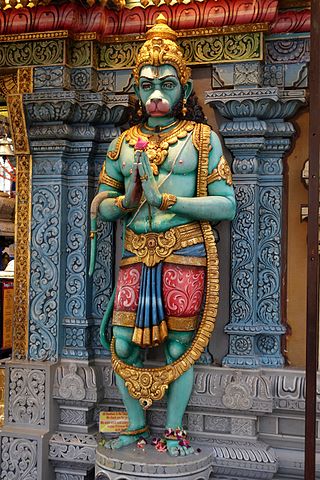Top Qs
Timeline
Chat
Perspective
Chiranjivi
Group of immortals in Hinduism From Wikipedia, the free encyclopedia
Remove ads
In Hinduism, the Chiranjivi (Sanskrit: चिरञ्जीवी SG.NOM, romanized cirañjīvī, pronounced [t͡ɕi.ɾɐɲ.d͡ʑiː.ʋiː]; चिरञ्जीविनः PL.NOM, romanized cirañjīvinaḥ, pronounced [t͡ɕi.ɾɐɲ.d͡ʑiː.ʋi.n̪ɐh], lit. 'long-living, immortal') are a group of immortals set to remain alive on Earth until the end of the current epoch, the Kali Yuga.[1]

Remove ads
Etymology and scriptural context
Summarize
Perspective
The Sanskrit nominal stem चिरञ्जीविन् (cirañjīvin) 'long-living; one who lives for a long time' is a tatpuruṣa compound composed of the adjective चिर (cira)—here in its adverbial form चिरम् (ciram) 'for a long time'—and the noun जीविन् (jīvin) 'one who lives', itself derived from the verbal root √जीव् (√jīv) 'to live'. The specific forms चिरञ्जीवी (cirañjīvī) and चिरञ्जीविनः (cirañjīvinaḥ) are, respectively, the masculine nominative singular and nominative plural inflections of this stem.
The term cirañjīvin denotes a being with a lifespan of an entire kalpa (aeon), distinct from the concept of amaratva, which signifies absolute immortality. The distinction is illustrated in mythological narratives: at the end of the last manvantara (age of Manu), the asura Hayagrīva attempted to attain immortality by swallowing the Vedas as they escaped from the mouth of Brahmā, but the scriptures were retrieved by Viṣṇu in his Matsya incarnation. Likewise, other avatars of Viṣṇu—Narasiṃha and Rāma—slew Hiraṇyakaśipu and Rāvaṇa, respectively, both of whom had sought immortality through devotion to Brahmā and Śiva. In this context, "immortal" can signify not absolute eternity but rather survival until the cosmic dissolution, when all embodied beings, including Brahmā himself, are destined to lose their material form with the destruction of the universe.[2]
Remove ads
List
Summarize
Perspective
The extant Purāṇas, the Rāmāyaṇa, and the Mahābhārata generally describe seven immortal personalities in the Hindu pantheon.[3] Some scholars opine the count to be eight.[4] Each chiranjivi embodies a distinct attribute of humankind; that attribute persists among humankind for as long as the chiranjivi lives.[5]
Other individuals who are sometimes additionally included to the list are the following:[13]
Remove ads
Cirañjīviśloka
The Cirañjīviśloka (चिरञ्जीविश्लोक) is a hymn that names the Chiranjivi and states the effects of their meditation:
|
Original Sanskrit: अश्वत्थामा बलिर्व्यासो हनुमांश्च विभीषणः। |
Transliteration: aśvatthāmā balirvyāso hanumāṃśca vibhīṣaṇaḥ. |
English translation: Aśvatthāmā, Mahābalī, Vyāsa, Hanumān, Vibhīṣaṇa, |
The mantra states that the remembrance of the eight immortals (Aśvatthāmā, Mahābalī, Vyāsa, Hanumān, Vibhīṣaṇa, Kṛpa, Paraśurāma, and Mārkaṇḍeya) offers one freedom from ailments and longevity.
References
Wikiwand - on
Seamless Wikipedia browsing. On steroids.
Remove ads
